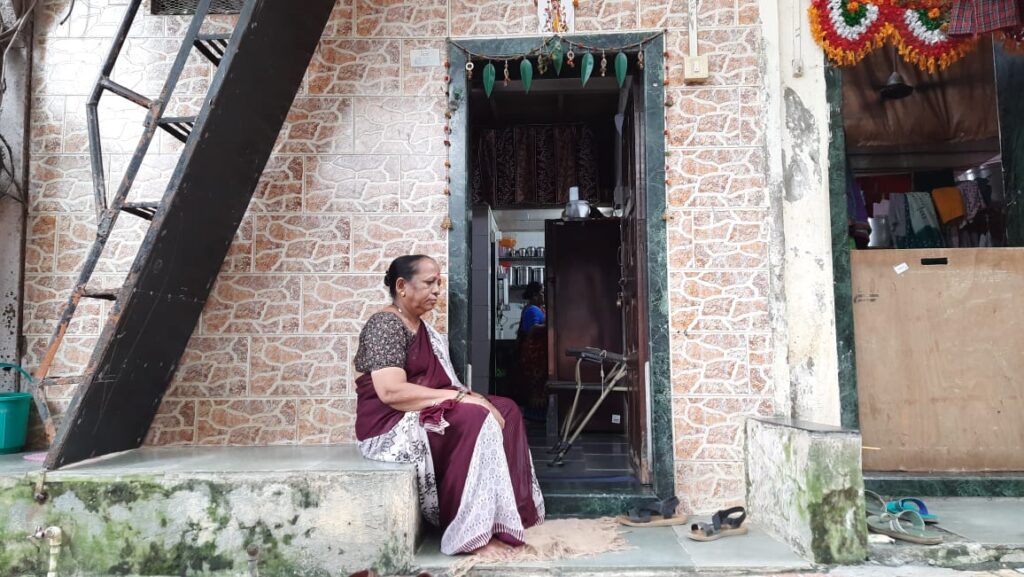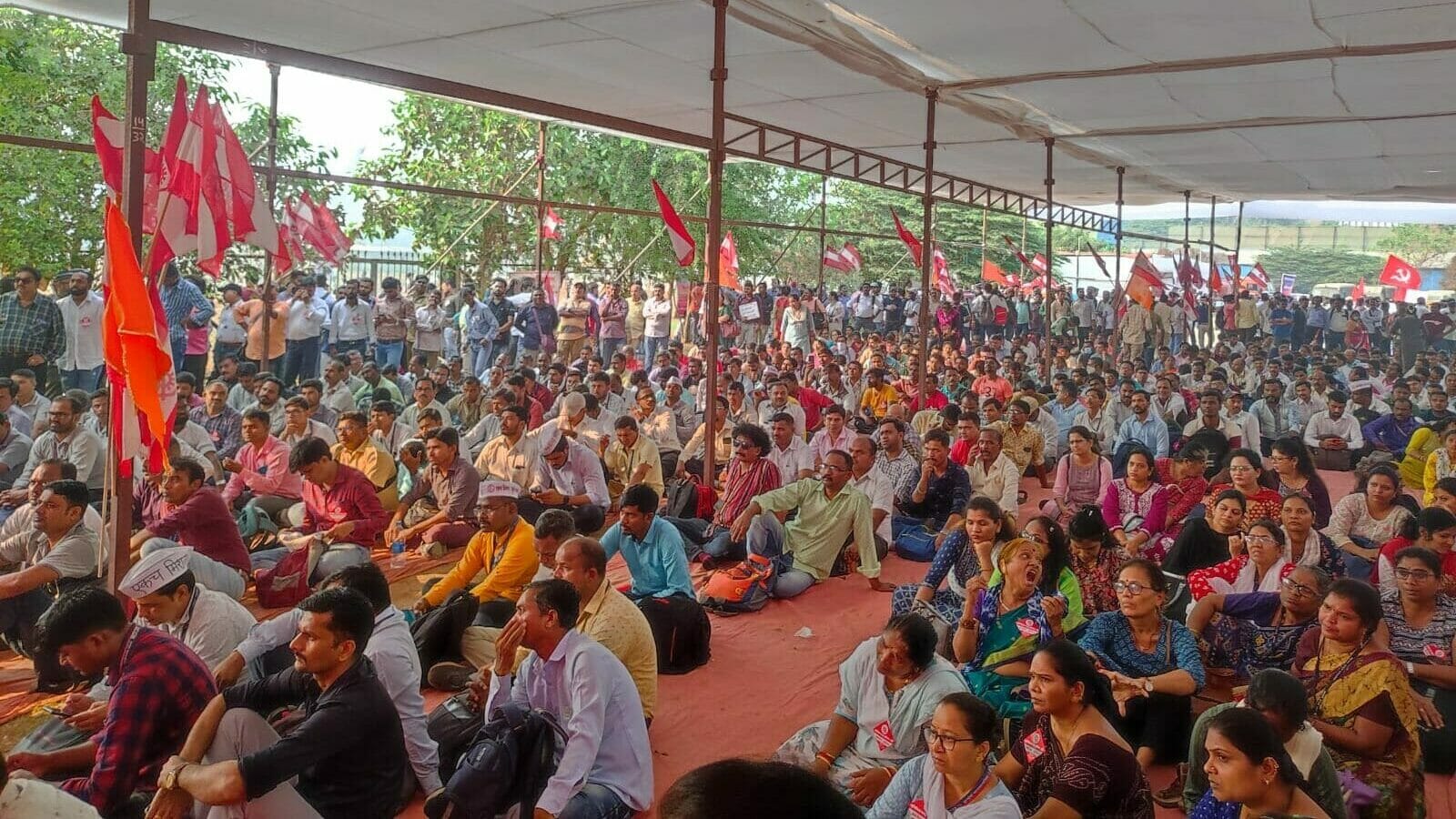It’s been more than two years since Vimal Gorakhnath Shinde retired, after working for over 30 years as a community health worker (CHW) with the Brihanmumbai Municipal Corporation (BMC).
After spending a lifetime doing this work for the civic body, she did not anticipate that she would have to fight to be recognised as an employee and wait endlessly for a pension.
She is one of 3700 health workers, who have been demanding to be recognised as employees, so that they get basic benefits such as pension.
Vimal’s eyes well up as she talks about her journey. Starting at 9.30 am in the morning Vimal used to do door-to-door surveys in Dharavi. She says they had to survey 200 houses per day but they were so involved, that they always covered more than the designated number of houses, even crossing a 1000 households.

“We used to go house to house, cross through different lanes to get the data on the health of Mumbaikars for BMC, but sadly, our demands are not being met,” says Vimal.
She feels proud that she was financially independent, when she worked as CHW. Ever since she retired, she has no income, and has lost that sense of self-assurance and confidence. Her husband is a retired postman. Her family of eight members struggles financially. They live in Dharavi.
Read more: How community health workers conduct annual TB, leprosy survey
The legal journey
Under the union of Mahanagarpalika Arogya Seva Karmachari Sanghatan, more than 3700 women community health workers have been fighting for various rights but mainly for the BMC to accept them as their employees.
If BMC recognises them as their employees, they will receive benefits such as maternity leave, pension, provident fund, and travel allowance The CHWs are part-time employees and fall under the employee’s provident fund and miscellaneous provisions act, of 1952. But the BMC does not have a direct employment relationship with them.
The Tribunal Court in the year 2002 declared that the community health workers also known as Arogya Sevika are entitled to an employee-employer relationship with BMC. On the other hand, the BMC challenged the decision of the Tribunal Court in the Bombay High Court. After a wait of 14 years, the Bombay High Court decided in favour of the community health workers. In 2017 the Bombay High Court confirmed the decision made by the Tribunal Court. After winning in two courts the decision is pending in the Supreme Court as the BMC challenged the decision again.

Role of community health workers
Contribution of community health workers is significant in public health management of the BMC. They are the ones who do door-to-door health surveys, spread awareness on maternal and child health care, immunisation, sanitation and personal hygiene, nutrition and any other work assigned by the health post doctor or nurses.
There are a total of 183 health posts spread across 24 wards in the city. Every health post has one full-time medical officer along with regular staff, public health nurse, an auxiliary nurse midwife, multi-purpose worker and community health workers.
“We are the closest to the people, and always on the ground, compared to any other medical fraternity member. Our education and awareness about polio injections, sanitation, education about family planning has made a huge difference over the years. When we used to see people taking care of themselves and volunteering to get polio injections, I felt our job was successful. The number of people registering for the treatment increased because of our constant interventions,” says Vimal.
Worsening condition of retired CHWs
Over the years the women workers have participated in morchas against BMC to demand their rights. Nalini Vinayak Pote is another CHW who is waiting for the BMC to agree to provide a pension.
Nalini also worked at the Dharavi Health Post and has been struggling post retirement. Her husband retired in 2001 and she worked till 2019. Her income was important to meet the expenses of their family. Her husband is paralysed and requires medical attention regularly. His pension is not enough for the medical and other expenses of the household.
“If I get pension, some amount of money will be available. Right now nothing is left, all the money goes for medical expenditure. Our condition could have been better, had I received pension,” says Pote.
Most of the CHWs, who have retired in the past few years, share similar experiences of financial struggles and helplessness.
When Citizen Matters reached out to the BMC officials, they refused to comment as the matter is still pending in the Supreme Court.
| Year | Wages |
| 1988 | Rs.100 |
| 1990 | Rs.200 |
| 1997 | Rs.500 |
| 1999 | Rs.750 |
| 2004 | Rs.900 |
| 2007 | Rs.1500 |
| 2009 | Rs.2500 |
| 2012 | Rs.4000 |
| 2014 | Rs.5000 |
| 2019 | Rs.9000 |
Prakash Devdas, the Union President, who has been working towards the cause of getting recognition and benefits for these CHWs says, “There are many delays in the judicial system of our country. It is not good. Poor people don’t get justice quickly. They do not have the money to hire prominent lawyers to fight their cases. It is exhausting. We have been fighting since the year 2000 and now it is 2023. The condition of these retired women is getting worse by the day.”
Prakash says, community health workers are crucial for successful delivery of public health facilities to the citizens. It is important to spread awareness of their condition and existence. Only when all stakeholders of the public health sector are treated fairly, will the system be truly efficient and functional, he says.
However, even as Vimal and Nalini wait for the legal case to reach its logical end, every day is filled with struggle and hope against hope.